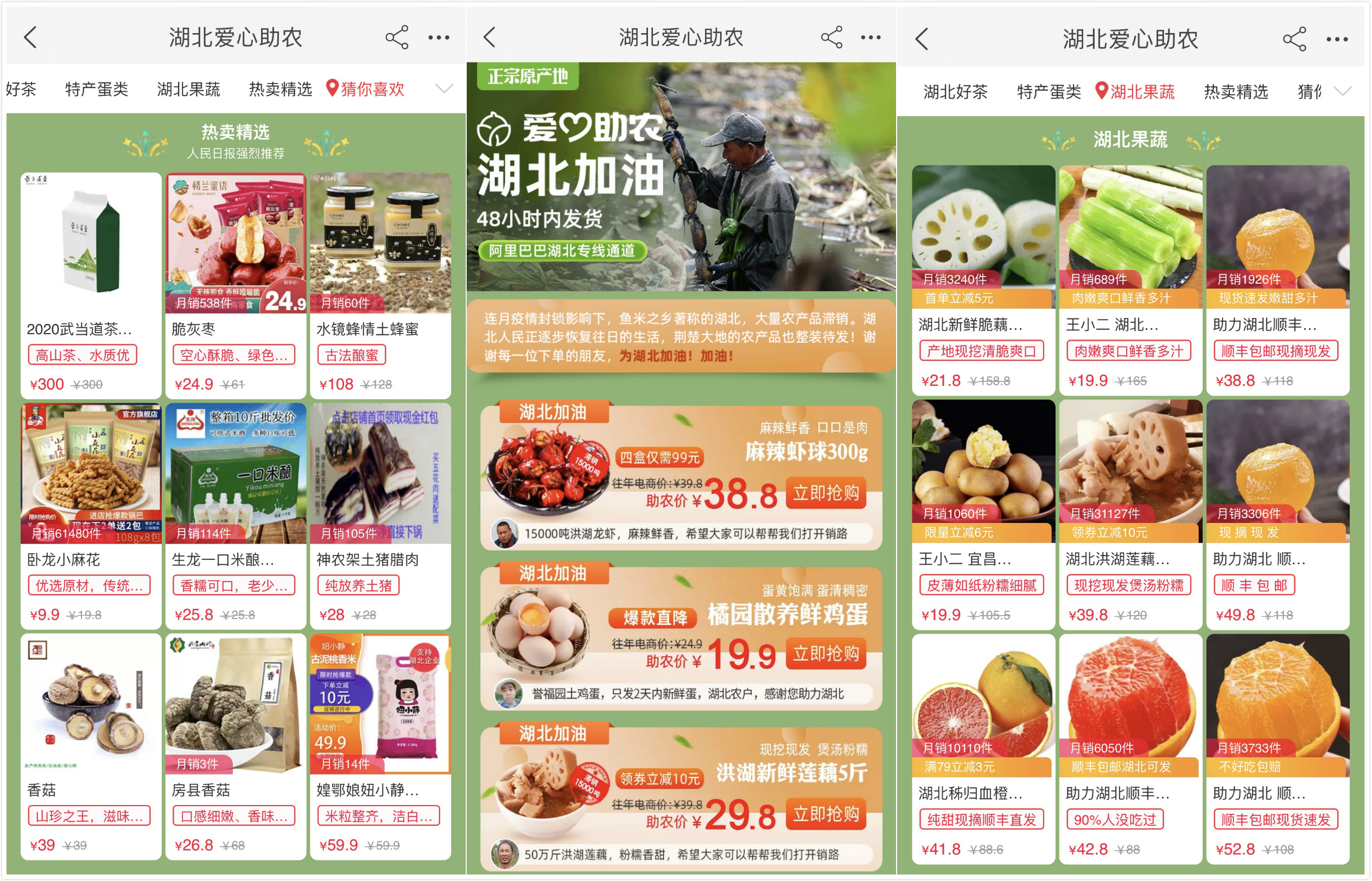On April 12, four days after the city of Wuhan in central China's Hubei Province lifted its 76-day lockdown, an unusual livestream went viral in China, attracting an accumulative total of 127 million views.
The livestream also distinguished itself with approximately 61 million yuan (8.7 million U.S. dollars) worth of Hubei's local products sold in just two hours, hitting a record high among the live broadcasts that are intended to help restart the province after its months-long standstill.
The two-hour charity livestream was held by a new pair of hosts, CCTV news anchor Ouyang Xiadan and Hong Kong actor Wong Cho Lam.
The deputy mayor of Shiyan City in the northwest of Hubei Province, another two Chinese actresses and 66 sales influencers on Chinese video sharing platform Kuaishhou also joined the show to help boost the promotion.

A combination of the posters of the second session of CCTV's charity livestream campaign on April 12, hosted by CCTV news anchor Ouyang Xiadan and Hong Kong actor Wong Cho Lam.
A combination of the posters of the second session of CCTV's charity livestream campaign on April 12, hosted by CCTV news anchor Ouyang Xiadan and Hong Kong actor Wong Cho Lam.
The show featured a total of twelve products, ranging from farm produce including the powder of kudzu vine roots and noodles made from sweet potato starch, to local specialties and bestselling foodstuffs like fried dough twists, Wolong rice crust and Hankow ErChang Soda. Star products such as hot dry noodles and peppery and spicy duck were sold out within seconds during the promotion.
Sunday's livestream is part of a non-profit campaign initiated by Chinese television network CCTV. With the title "Thank you for group buying Hubei's products," the event is committed to stimulating demand for products made in the region and helping the place once hardest-hit by the pandemic tide over its difficulties.

The first session of the special livestream was held by CCTV news host Zhu Guangquan paired up with one of China's top livestreaming celebrities Li Jiaqi on April 6. /Screenshot of CCTV Livestream
The first session of the special livestream was held by CCTV news host Zhu Guangquan paired up with one of China's top livestreaming celebrities Li Jiaqi on April 6. /Screenshot of CCTV Livestream
The campaign started with the first session of livestream on April 6, two days before Wuhan reopened, when another CCTV news host Zhu Guangquan teamed up with one of China's top livestreaming celebrities Li Jiaqi to promote 16 commodities via live broadcasting.
The two-hour show hosted by the unique pair drew nearly 122 million views and 160 million thumbs-ups, yielding about 40 million yuan (about 5.7 million U.S. dollars) worth of local products. The nickname of the pair, a homophone of a British children's series "Peppa Pig," even became one of the most searched hashtags that day on Weibo, China's equivalent of Twitter.
The third session of the campaign is reportedly scheduled for April 15, where 30 county mayors in Hubei Province are expected to promote local products by joining a group of hosts from CCTV via livestreaming programs.
Starting from late March, Chinese media and e-commerce platforms have made a slew of collaborative efforts to promote sales of overstocked produce in Hubei Province. Nationwide campaigns have thereafter witnessed a decreasing inventory of agriculture products like vegetables, eggs and fish.

The special page initiated on Taobao, a Chinese online shopping website from e-commerce giant Alibaba, aims to facilitate sales of Hubei's agricultural products and local specialties. /Screenshot of Taobao
The special page initiated on Taobao, a Chinese online shopping website from e-commerce giant Alibaba, aims to facilitate sales of Hubei's agricultural products and local specialties. /Screenshot of Taobao
As the region endeavors to shake off the dust of the previous weeks with aid from the Chinese authorities, aside from boosting the livestream cooperation with media, e-commerce platforms alone have rolled out measures to assist the virus-hit region with healing its economy.
Since March end, Taobao, a Chinese online shopping website from e-commerce giant Alibaba, has launched a special page for the sales promotion of Hubei's products. The B2C platform spun off from Taobao, Tmall, which features brand owners and authorized dealers, will keep facilitating sales of over 20,000 agricultural products and local specialties in 50 provenances in Hubei Province this year.
JD.com, another Chinese e-commerce giant, also announced on April 8 that the company would invest more than six billion yuan in Hubei Province over the next three years to support the region's economic resumption. Some other measures of assistance also included a set of initiatives such as the "Spring Raindrop Plan," a number of partnerships signed to boost the region's smart city services, fresh food industrial supply chain as well as local brands built-up etc.
Other e-commerce websites such as Pinduoduo and Suning.com have also reportedly announced a string of preferential measures to ease the pressure of local retailers on their platforms.